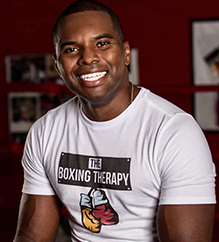THE BOXING THERAPY
Life is a Fight for Your Dreams
ABOUT US
The Boxing Therapy is designed to help people boost and increase their self-disciplined, self-esteem, self-motivation, self-confidence, self-control, coordination while reducing stress, depression anxiety, addiction, or anger. The Boxing Therapy is located in the heart of St Charles, Missouri. Skilled team members are here to help participants achieve their goals. Are you ready to fight for your dreams? Call us today to learn more about The Boxing Therapy.


TEAM

Dr. José Jones
Personal trainer and founder of The Boxing Therapy. Dr. Jones currently has his private practice and gym where he practices Boxing Therapy. Three of his major programs are “Real Living Champions in Life”, “Living Life Without a Label” and Ko Mental Health Bootcamp. Dr. Jones holds three Masters degrees and earned a Doctorate in Education from Lindenwood University in 2018. Dr. Jones has been involved in numerous certified courses and seminars such as National Certified Facilitrainer for NCCJ (Social Justice), CPR, Play TherapyGrief Therapy, Motivational Interviewing, HIPPASexual HarassmentSafetySchool Regulation, Bloodborne Pathogen, Diversity, Social Justice.

Natalia Nieto
Advanced Course Instructor
We’re happy to welcome Natalia Nieto as the newest member of our team as one of ours. Instructor, they’re committed to providing students with the skills and tools necessary to continue their learning journey.
Boxing and PARKINSON
According to Long (2020) engagement in exercise and physical activity produce positive effects in people with parkinson disease, including improvements in motor and cognitive functions. People with parkinson disease are 1/3 less active than healthy adults and physical activity levels decline.
by Long, Katrina M., Ed.D., Teachers College, Columbia University, 2020, 255; 27739595


Boxing and AUTISM
According to Mckeehan (2012), boys with Autism may benefit from participation in mixed martial arts training. Furthermore, discussion considers advantages of martial arts over traditional behavior therapy for children with autism, such as reduced cost, availability in most areas of the United States, and less stigmatization than a treatment setting.
By McKeehan, James, M.S.Psy. Kaplan University. 2012
Boxing and ADHD
According to Chambers (2016) a vigorous 10-min daily regime of short-burst-high- intensity exercise improves the working memory and on-task behavior of preadolescent children diagnosed with ADHD
by Chambers, Stuart Alva, Ed.D., Piedmont College, 2016, 231; 10111590
(Young) "Boxing, especially, teaches impulse control and channels emotions in a constructive way. "People with ADHD have so many positives. They are often fun, creative and engaging. They might simply need help to channel their energy and sport is great way to do this.
https://www.bbc.com/news/uk-wales-48720809

BOXING AND DEPRESSION/ ANGER
(Fletcher) It can help you manage anger and overcome it. “Hitting a punching bag can be a physical and symbolic expression of stress or anger. Physically, hitting a punching bag produces a response in your body that helps to relieve tension.
https://www.netdoctor.co.uk/healthy-living/fitness/a27734/boxing-mindfulness-help-anxiety-and-depression/
Outside of these physical benefits, the effect that boxing can have on your mental well being is a factor that is worth remembering too. There’s so much more to boxing than just mindlessly fighting other people to see who the better fighter is. Every step of the way from building your stamina to mastering your skills in the ring can have a genuine and permanent effect on your mental health.
https://www.exercise.co.uk/learn/the-effects-of-bo
Anger
Combining boxing training with group counseling can provide at-risk youth with an activity to keep them entertained and at the same time provide an opportunity for personal growth (Wright et al., 2006). Wright et al. (2006) identified 10 attributes of boxing as a component of group work which can lead to violence prevention.
The aggression and violence experienced by youth over the past few decades have created a concern among teachers, mental health professionals, and the larger community (Bundy & McWhiter, 2011). The need to address these ongoing issues has led to the development of programs such as after-school community programs with a focus on self-regulation skills for at- risk youth (Stewart, Rapp-Paglicci, & Rowe, 2011).
By Cruz, Edwin, M.S.W., California State University, Long Beach, 2018, 49; 10785298
Stress
“Physical activity is a known stress reducer; runners experience the phenomenon of a ‘runner’s high’, and boxing is no different. When working out on the punching bag, your brain increases the production of endorphins, the neurotransmitters that create feel-good thoughts. Punching helps to relieve muscle tension that can collect when you experience stress. As you continue to punch, you will find your focus is improved, increasing your concentration and helping you forget the reasons why you are stressed.”
https://www.harpersbazaar.com/uk/beauty/fitness-wellbeing/a19613933/boxing-benefit-mental-health/#:~:text=%E2%80%9CPhysical%20activity%20is%20a%20known,that%20create%20feel%2Dgood%20thoughts.
Addiction
Addiction and alcoholism can create muscular atrophy and malnutrition, which leaves the body weak. Boxing builds muscle, can help the body lose unhealthy weight, and strengthens the heart through cardio exercise. In addition, the body gains power in the legs, core, arms, shoulders, and back. More importantly, boxing is a discipline. Coaches for boxing encourage a meditative focus for their boxers which increases mindfulness and clarity. As a workout for mind and body, the benefits of boxing are endless.
Some other benefits of boxing include:
Builds self-esteem
Builds confidence in ability to defend
Increases mental focus and clarity cerebrally
https://www.simplerecovery.com/boxing-is-a-healthy-release-and-exercise-during-treatment/